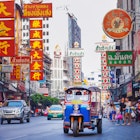
No more 7-day quarantine as Thailand encourages vaccinated tourists to return

Jan 20, 2022 • 4 min read

Thailand is resuming its quarantine-free entry program for international visitors ©Getty Images
Thailand is resuming its Test-and-Go tourism plan from February, which means that fully vaccinated visitors can bypass seven-day quarantine and travel to any part of Thailand, provided they take a negative COVID-19 test on the first and fifth day of their visit.
Fully vaccinated tourists from 63 countries, including United States, the United Kingdom, Australia, Canada, Ireland, Germany, China, Singapore, Spain, France, Italy, the United Arab Emirates, and Malaysia, can soon avail of the Test-and-Go program again after the government suspended it in December due to the uncertaintity surrounding the Omicron variant.
The (almost) quarantine-free entry Test-and-Go plan requires fully vaccinated arrivals to have COVID-19 insurance cover of at least US$50,000 (£36,600), and present proof of a negative COVID-19 PCR test before they depart for Thailand.
New applicants for the Test-and-Go program are also required to undergo two additional COVID-19 tests upon arrival and must, at their own expense, spend the first night and fifth night in Thailand quarantining at a government-approved hotel while awaiting their results (COVID-19 test results can take about 24 hours to be processed). Tourists must stay in their room while awaiting the result. But once the result is negative, tourists will be free to move and travel around Thailand much in the same way that any Thai citizen can.

Anyone who applied for the Test-and-Go program before December 22 and received their QR code is required to take their test on day five and six instead.
Government spokesperson Taweesilp Wisanuyothin told reporters, via The Bangkok Post, that the Test-and-Go program can resume on February 1 now that the Omicron peak has passed. The tourism program will be kept under review though, along with the Sandbox program (Thailand's first phase of its return to tourism which allows fully vaccinated visitors from any country to travel to approved locations such as Phuket, Krabi and Ko Pha-ngan for at least seven days before being free to travel around Thailand).
"In case there are more infections or the situation changes, there will be a re-assessment for inbound travellers and adjust toward the Sandbox scheme," Wisanuyothin said.
Travelers are also required to download the MorChana app, a tracking app where they will be reminded to take another antigen test on day five. Travelers under the age of 12 are exempt from vaccination requirements but they will be required to undergo testing.
Unvaccinated travelers in Thailand
People who are not vaccinated can also visit Thailand under the country's Alternative Quarantine program. They must apply for a Thailand Pass and travelers over the age of six must take a negative pre-departure COVID-19 test no more than 72 hours before traveling. They'll also have to have an insurance policy with at least US$50,000 coverage and pay for their quarantine accommodation before traveling to Thailand, as well as their PCR tests.
Travelers who are fully vaccinated with an approved dose (or at least one dose for travelers under the age of 18) are required to quarantine for seven days and take two PCR tests. Travelers who are not fully vaccinated must quarantine for 10 days and take three PCR tests. When they quarantine period is over, travelers will be free to travel around Thailand.
Read more: Full Moon Party or peaceful paradise? Thailand has a beach for you

Thailand entry fee
Meanwhile, Thailand is considering introducing a tourist fee of 300 baht ($9/£7) in April, though it has yet to be approved. If introduced, the charge would be applied to all international tourists, regardless of where they are coming from and included in their airfare.. According to Thailand's tourism ministry, the revenue generated from the fee would be used to fund the sustainable management of Thailand's tourism resources, in addition to covering accident insurance for tourists who can't afford it.
"We've encountered times when insurance didn't have coverage for tourists... which became our burden to take care of them," the country's tourism minister, Yuthasak Supasorn, told Reuters.
Thailand continues to categorize provinces into dark red, red and orange zones based on their COVID-19 risk, with varied restrictions in place across each zone. Check the latest advice for the area you are traveling to before departure. Face masks are compulsory across Thailand and must be worn in indoor and outdoor public places and on public transport.
You might also like:
The quickest, easiest and most affordable ways to get around in Thailand
You won't believe the views on these 9 iconic Thailand hikes
Bali is now open to international travelers from these countries
Explore related stories

COVID-19
Laos reopens and prepares for international tourists with few restrictionsMay 12, 2022 • 2 min read


 COVID-19CDC adds 22 countries to highest alert, UK eases restrictions: Here's Friday around the planet
COVID-19CDC adds 22 countries to highest alert, UK eases restrictions: Here's Friday around the planetJan 21, 2022 • 4 min read
 Air TravelThese countries have imposed travel restrictions due to the Omicron COVID-19 variant
Air TravelThese countries have imposed travel restrictions due to the Omicron COVID-19 variantNov 30, 2021 • 6 min read
 COVID-19Cambodia is the latest country in Southeast Asia to drop quarantine for vaccinated visitors
COVID-19Cambodia is the latest country in Southeast Asia to drop quarantine for vaccinated visitorsNov 15, 2021 • 2 min read
 COVID-19Thailand to reopen Chiang Mai, Bangkok, Pattaya and more destinations to tourists in November
COVID-19Thailand to reopen Chiang Mai, Bangkok, Pattaya and more destinations to tourists in NovemberSep 27, 2021 • 3 min read



